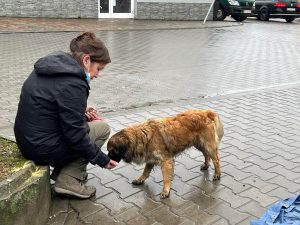
Recently returned from a “deployment” to Poland to help stranded Ukrainian pets, San Diego Humane Society president Dr. Gary Weitzman said the best thing concerned San Diegans can do to support the humanitarian veterinarian effort is to aid existing charities already there.
“I’d been desperate to find a way to go and see if I could help,” said Weitzman, who just returned from 10 days in Przemyśl, Poland on a mission to provide veterinary care, where he helped set up a border-crossing veterinary clinic. “We’ve been hearing from a lot of people who have been thinking about the welfare of the animals, and about trying to minimize what’s happening to them. We’ve all been shocked by what’s happening.”
Weitzman noted SDHS has partnered with Greater Good Charities based out of Tucson, Ariz., along with other animal and non-animal groups, to help Ukrainian pet refugees in Romania and Poland.
“Greater Good wanted to go and asked if I, and my team, could help in any way,” noted Weitzman adding, “We needed to get the lay of the land, so we wanted to do an exploratory trip first to find out what might be needed in this terribly long ordeal.”
Greater Good Charities works to help people, pets, and the planet by mobilizing in response to need and amplifying the good.
The SDHS head vet said his team encountered problems from the get-go after landing in Warsaw, the Polish capital. “The team got stricken with COVID, though there was not much sign of it with fewer people masking anymore and no social distancing,” said Weitzman. “A lot of those people ended up testing positive and being quarantined in Romania for a week. I stayed in contact with them by phone.”

Weitzman encountered two subsets of Ukrainian animals overseas. “The first was animals that were lucky enough to have owners that cared for them very well and hand-carried them across the border,” he said. “The other group was much more tragic, animals that had to be left behind, not because people didn’t want to bring them, but because the last couple of weeks the authorities have stopped the migration of large dogs across the border.”
Weitzman added that “some dogs had been left tied to the border fence,” while other strays were “fending for themselves. Some rescue groups had set up temporary animal shelters and I was working with them.”

Asked if refugee animals were available for adoption in the United States, Weitzman said that alternative wasn’t, and probably won’t be, available.
“The problem is these animals need to get back to their people who were forced to leave them behind,” he said. “Our hope is that their families may come back to get them. San Diego is far away from the front of that war, and it would be a really difficult journey for those animals.”
Weitzman pointed out, however, that “Europe is being overwhelmed by the animals and is placing them in shelters until they get into a new home.”
The vet said he already wants to go back, despite being exhausted from his recent Poland trip. He added that SDHS’ current game plan is to continue to work with Greater Good Charities to determine what the veterinary needs really are for countries taking in Ukrainian refugee pets.
“We’re going to wait until we see what the veterinary needs are over there, then help them (animals) wherever they end up, which could well be back on the Ukrainian side of the border,” Weitzman said.









